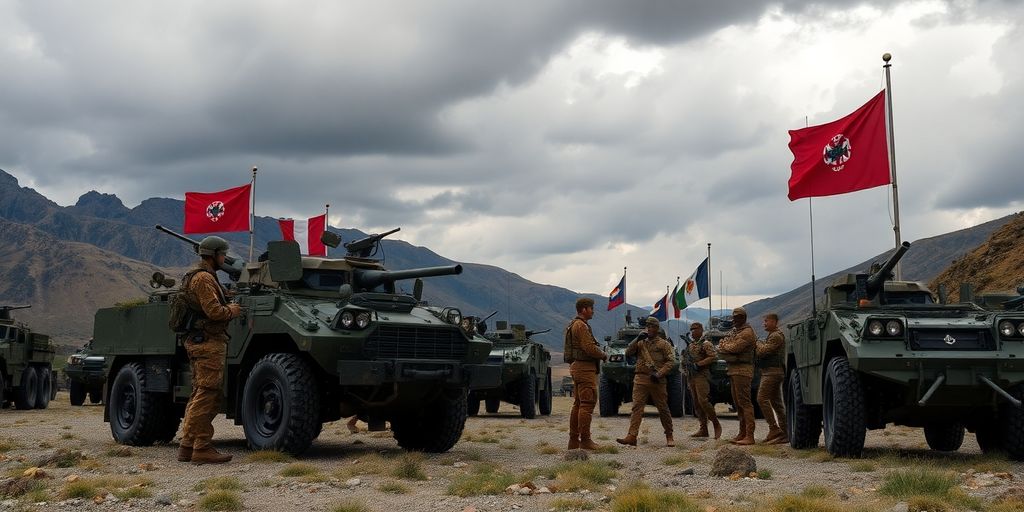Tensions are escalating in the Balkans following the formation of a new military alliance between Albania, Croatia, and Kosovo. This trilateral agreement, signed on March 18, 2025, has provoked a strong reaction from Serbia, which is now considering its own military partnerships, potentially with Hungary. The shifting alliances in the region raise concerns about stability and the potential for renewed conflict.
Key Takeaways
- A new military alliance has been formed between Albania, Croatia, and Kosovo.
- Serbia is contemplating a military alliance with Hungary in response.
- The situation reflects a broader trend of militarization in the Western Balkans.
- NATO’s role in maintaining stability is increasingly critical amid these developments.
The Formation of New Alliances
On March 18, 2025, Albania, Croatia, and Kosovo signed a trilateral security cooperation agreement aimed at enhancing regional stability and defense capabilities. This agreement is seen as a strategic move to bolster Kosovo’s integration into NATO, despite its unresolved status and ongoing tensions with Serbia.
The defense ministers of the three countries emphasized that the alliance is not intended to threaten any nation but serves as a united front against potential destabilization efforts, particularly from Serbia. Kosovo’s Defense Minister, Ejup Maqedonci, stated, "We are united and will not allow anyone to destabilize the region."
Serbia’s Reaction
In response to the new alliance, Serbia has expressed alarm and is reportedly considering forming its own military pact with Hungary. This potential alliance is particularly noteworthy as Hungary is a member of both the EU and NATO, raising questions about the implications for regional security dynamics.
Serbian President Aleksandar Vučić’s government has been under pressure from domestic unrest and protests, which may influence its military strategy. The Serbian media has reported on plans for this alliance, indicating a significant shift in Serbia’s long-standing policy of military neutrality.
NATO’s Role in the Region
NATO has reaffirmed its commitment to the stability of the Western Balkans, with Secretary General Mark Rutte emphasizing the importance of the Dayton Peace Agreement in maintaining peace in Bosnia and Herzegovina. NATO’s presence in the region, particularly through its KFOR mission in Kosovo, is crucial for preventing a security vacuum that could lead to conflict.
Rutte’s recent visits to Sarajevo and Pristina highlighted NATO’s ongoing support for regional security and the need for political leaders to take responsibility for stability. He stated, "NATO will continue to play its part in close coordination with the Kosovo Police and the EU Rule of Law Mission in Kosovo."
The Broader Implications
The emergence of these military alliances in the Balkans reflects a troubling trend of increasing militarization and geopolitical maneuvering. The potential for conflict is heightened by historical grievances and unresolved territorial disputes, particularly between Serbia and Kosovo.
As the region grapples with these challenges, the role of NATO becomes even more critical. The alliance must navigate the complexities of regional politics while ensuring that its member states remain committed to collective security and peace.
In conclusion, the recent developments in the Balkans underscore the fragile nature of peace in the region. The formation of new military alliances and the potential for further militarization pose significant risks, necessitating a concerted effort from NATO and regional leaders to foster dialogue and cooperation.
Sources
- The shifting alliances and militarization of the Western Balkans : Peoples Dispatch, Peoples Dispatch.
- News: NATO reaffirms its commitment to Western Balkans stability, as Secretary General Rutte wraps up visits to Sarajevo and Pristina, 10-Mar.-2025, NATO.
- How the Balkans divides into military alliances and what it could mean, Європейська правда.
- The Western Balkans’ Emerging Voice in NATO, Foreign Policy.






